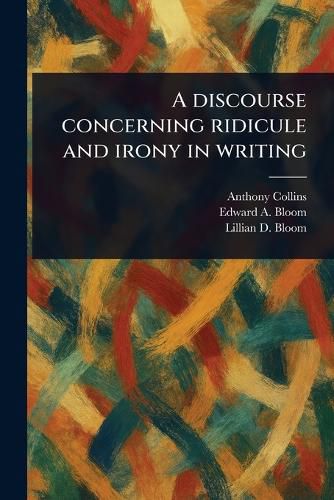Readings Newsletter
Become a Readings Member to make your shopping experience even easier.
Sign in or sign up for free!
You’re not far away from qualifying for FREE standard shipping within Australia
You’ve qualified for FREE standard shipping within Australia
The cart is loading…






This title is printed to order. This book may have been self-published. If so, we cannot guarantee the quality of the content. In the main most books will have gone through the editing process however some may not. We therefore suggest that you be aware of this before ordering this book. If in doubt check either the author or publisher’s details as we are unable to accept any returns unless they are faulty. Please contact us if you have any questions.
Anthony Collins's "A Discourse Concerning Ridicule and Irony in Writing (1729)" is a sharp and insightful exploration of satire as a literary tool. This meticulously prepared edition makes available a foundational text on the art of ridicule and its persuasive power.
Collins delves into the effective use of irony and satire, offering a critical perspective on 18th-century writing. He examines how these techniques can be wielded for both humor and profound criticism. This discourse provides a window into the literary and philosophical debates of its time, revealing the intricacies of crafting effective satire.
A significant work of literary criticism, "A Discourse Concerning Ridicule and Irony in Writing" remains relevant for its analysis of satire as a mode of political and social commentary. Readers interested in the history of writing, satire, and the enduring power of wit will find this book an engaging and thought-provoking read. It is a valuable resource for anyone studying the art of persuasive writing and the use of humor as a critical lens.
This work has been selected by scholars as being culturally important, and is part of the knowledge base of civilization as we know it.
This work is in the public domain in the United States of America, and possibly other nations. Within the United States, you may freely copy and distribute this work, as no entity (individual or corporate) has a copyright on the body of the work.
Scholars believe, and we concur, that this work is important enough to be preserved, reproduced, and made generally available to the public. We appreciate your support of the preservation process, and thank you for being an important part of keeping this knowledge alive and relevant.
$9.00 standard shipping within Australia
FREE standard shipping within Australia for orders over $100.00
Express & International shipping calculated at checkout
Stock availability can be subject to change without notice. We recommend calling the shop or contacting our online team to check availability of low stock items. Please see our Shopping Online page for more details.
This title is printed to order. This book may have been self-published. If so, we cannot guarantee the quality of the content. In the main most books will have gone through the editing process however some may not. We therefore suggest that you be aware of this before ordering this book. If in doubt check either the author or publisher’s details as we are unable to accept any returns unless they are faulty. Please contact us if you have any questions.
Anthony Collins's "A Discourse Concerning Ridicule and Irony in Writing (1729)" is a sharp and insightful exploration of satire as a literary tool. This meticulously prepared edition makes available a foundational text on the art of ridicule and its persuasive power.
Collins delves into the effective use of irony and satire, offering a critical perspective on 18th-century writing. He examines how these techniques can be wielded for both humor and profound criticism. This discourse provides a window into the literary and philosophical debates of its time, revealing the intricacies of crafting effective satire.
A significant work of literary criticism, "A Discourse Concerning Ridicule and Irony in Writing" remains relevant for its analysis of satire as a mode of political and social commentary. Readers interested in the history of writing, satire, and the enduring power of wit will find this book an engaging and thought-provoking read. It is a valuable resource for anyone studying the art of persuasive writing and the use of humor as a critical lens.
This work has been selected by scholars as being culturally important, and is part of the knowledge base of civilization as we know it.
This work is in the public domain in the United States of America, and possibly other nations. Within the United States, you may freely copy and distribute this work, as no entity (individual or corporate) has a copyright on the body of the work.
Scholars believe, and we concur, that this work is important enough to be preserved, reproduced, and made generally available to the public. We appreciate your support of the preservation process, and thank you for being an important part of keeping this knowledge alive and relevant.